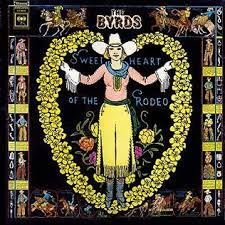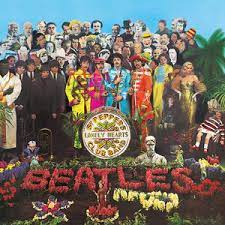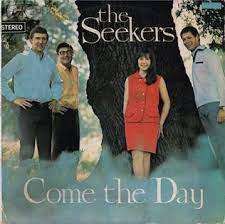Pricing: $3.25ea OR any 10 for $10
(use code "Any10410" at checkout)
Paid Requests for $25ea
(comes with any 8 freebies -> so 9 for $25)
100's Of Free Demos & Chord Sheets
Famous Bands In The 60s
On The Acoustic
Welcome to my famous bands in the 60s songs page where you'll find a few songs from Buffalo Springfield, The Kingston Trio and The Beau Brummels you can easily learn on the acoustic guitar. Check out the "60s" link above for many more songs from bands and artists from the 1960's.
You'll find free demos, sample videos, chord sheets, rhythm tips and more. If you require a full instructional video tutorial you can get one for a small fee. Discount pricing listed above.

Jump menu to quickly access the artists on this page.
Famous Bands In The 60s
Chords, Samples, Demos, Tutorials
1. Chilly Winds - The Kingston Trio
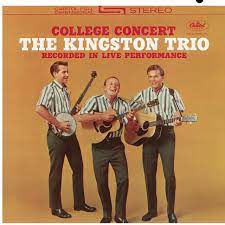
Chilly Winds is a traditional folk song that was popularized by The Kingston Trio in the late 1950s. The song tells the story of a sailor who is forced to leave his true love behind and face the cold and lonely sea. The lyrics describe the harsh conditions of life at sea and the sailor's longing for his sweetheart.
The Kingston Trio recorded "Chilly Winds" in 1958 for their self-titled debut album, which became a commercial success and helped to popularize the folk music revival of the late 1950s and early 1960s. The song features the group's signature three-part harmonies and acoustic instrumentation, including guitar, banjo, and bass.
"Chilly Winds" has since become a folk standard and has been covered by many other artists, including Peter, Paul and Mary, Judy Collins, and Bob Dylan. The song's haunting melody and poignant lyrics continue to resonate with audiences today, making it a beloved classic in the folk music canon.
- Drop D Tuning = No
- Capo = 4th fret
- Rhythm = root down up root up down up and repeat
- Picking = No
- Chords = G, Am, D7, C
Jump To Top
2. Desert Pete - The Kingston Trio
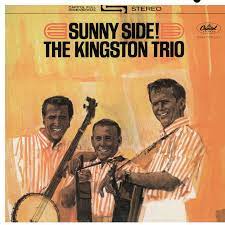
Desert Pete is a folk song that was recorded by The Kingston Trio in 1961. The song tells the story of a thirsty traveler in the desert who comes across a hand pump with a note from "Desert Pete" instructing the traveler to use the pump, but cautioning that the pump is dry and that the traveler will need to prime it with a cup of water that is buried nearby.
The lyrics of "Desert Pete" were written by Billy Edd Wheeler, a songwriter and musician from West Virginia. The song was inspired by Wheeler's own experiences traveling in the desert Southwest and encountering hand pumps like the one described in the song.
The Kingston Trio's recording of "Desert Pete" features their trademark three-part harmonies and acoustic instrumentation, including guitar, banjo, and bass. The song was a modest commercial success for the group, reaching #35 on the Billboard Hot 100 chart.
"Desert Pete" has since become a classic of the folk music genre and has been covered by many other artists, including Johnny Cash, Bob Dylan, and Judy Collins. The song's simple yet compelling story, catchy melody, and memorable chorus have made it a favorite among folk music enthusiasts for decades.
- Drop D Tuning = No
- Capo = No
- Rhythm = root down up down up down up and repeat
- Picking = No
- Chords = E, A, B7, AB, Db
Jump To Top
3. Don't Talk To Strangers - The Beau Brummels
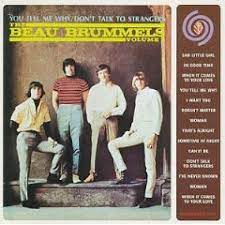
Don't Talk to Strangers is a notable song by The Beau Brummels, featured on their album "The Beau Brummels, Volume 2," released in 1965. The song, like many of their works, captures the essence of folk-rock and pop that defined the band.
In terms of chart success, "Don't Talk to Strangers" didn't chart as highly as some of their other hits. Nevertheless, it resonated with fans and showcased The Beau Brummels' ability to craft melodic, harmonious tunes.
Over the years, a number of artists have covered "Don't Talk to Strangers," including pop singer Rick Nelson. This demonstrates the song's enduring appeal and its ability to cross genres and time periods.
A fascinating piece of trivia about the song is that it was written by Ron Elliott, one of the band's key members. The song's lyrics caution against the dangers of talking to strangers, a theme that remains relevant and poignant to this day.
"Don't Talk to Strangers" is a testament to The Beau Brummels' ability to create timeless music with enduring messages. Despite not achieving chart-topping success, it's a beloved part of their catalog and showcases their contribution to the folk-rock and pop music of the 60s.
- Drop D Tuning: No
- Capo: No
- Rhythm: down down up down up down up and repeat
- Picking: No
- Chords: D, F, G, A, Bm, E, Gbm
Jump To Top Famous Bands In The 60s
4. For What Its Worth - Buffalo Springfield
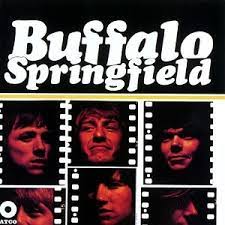
For What It's Worth was recorded Buffalo Springfield and written by the group's guitarist and vocalist Stephen Stills. The song was released in January 1967 as a single and later included on their self-titled debut album.
The song is widely interpreted as a reflection of the social and political unrest that was prevalent in the United States during the mid-1960s, particularly related to the Vietnam War and civil rights movement. The lyrics describe a confrontation between protesters and police, and the confusion and fear that can arise in such situations.
The recording features Stills on lead vocals and guitar, with fellow band members Neil Young on guitar and Richie Furay on backing vocals. The song is notable for its distinctive guitar riff and the use of tremolo and reverb effects.
The song was not initially a commercial success, only reaching #7 on the Billboard Hot 100 chart, but it has since become one of the most enduring and iconic songs of the 1960s. It has been featured in numerous films and TV shows, and has been covered by a wide range of artists. In 2004, Rolling Stone ranked "For What It's Worth" #63 on its list of the 500 Greatest Songs of All Time.
- Drop D Tuning: No
- Capo: No
- Rhythm: a steady up and down will work
- Picking: a little
- Chords: E, A, D, C, G/A
Jump To Top
5. Kind Woman - Buffalo Springfield
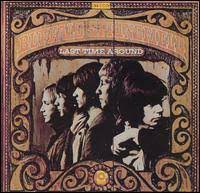
Kind Woman from Buffalo Springfield, was written by the group's bassist and vocalist Richie Furay. The song was included on their third and final album, "Last Time Around," which was released in 1968.
"Kind Woman" is a gentle, acoustic-based ballad that showcases Furay's vocals and features intricate guitar work from Stephen Stills. The song has been interpreted as a tribute to Furay's wife, Nancy, and as a reflection on the joys and challenges of a long-term relationship.
The recording features Furay on lead vocals and rhythm guitar, with Stills on lead guitar, Neil Young on piano, and Jim Messina on bass. The song's arrangement is notable for its use of harmonies and counterpoint, particularly in the instrumental break.
"Kind Woman" was not released as a single and did not receive significant airplay, but it has since become a fan favorite and has been covered by several artists. The song is considered one of the highlights of "Last Time Around," which was recorded during a period of tension and conflict within the band and marked their final studio album together.
- Drop D Tuning: No
- Capo: No
- Rhythm: down down up down up and repeat
- Picking: Yes
- Chords: C, G, C#, D, Db, Em
Jump To Top Famous Bands In The 60s
6. Laugh Laugh - The Beau Brummels
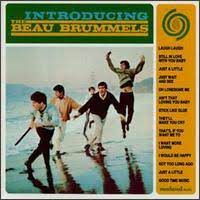
Laugh Laugh is one of the standout tracks by The Beau Brummels, featured on their 1965 debut album, "Introducing... The Beau Brummels." This song played a pivotal role in launching the band's career and capturing the essence of the mid-60s pop and folk-rock sound.
"Laugh, Laugh" was a massive success for the band, reaching No. 15 on the Billboard Hot 100 chart. The song's catchy melody and memorable lyrics marked a breakthrough moment for The Beau Brummels, solidifying their place in the music scene.
Over the years, "Laugh, Laugh" has remained a classic and has been covered by various artists. Its enduring appeal and timeless sound have made it a beloved part of pop and rock music history.
A notable piece of trivia about the song is that it was the first hit single for The Beau Brummels. It helped pave the way for their future success and established them as one of the prominent bands of the mid-60s.
"Laugh, Laugh" is a testament to the band's ability to create music that resonates with listeners. Despite the changing musical landscape, the song continues to be celebrated for its catchy and energetic sound, making it a cherished piece of The Beau Brummels' legacy.
- Drop D Tuning: No
- Capo: 2nd fret
- Rhythm: root up down up (repeat) and root down up down up root up down up and repeat
- Picking: No
- Chords: Em, Em/Db, Am, G, C, F, D, A#, D#, G#
Jump To Top
7. Mr Soul - Buffalo Springfield
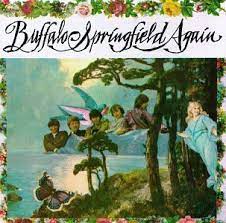
Mr. Soul is a song by Buffalo Springfield, written by the group's guitarist and vocalist Neil Young. The song was included on their second album, "Buffalo Springfield Again," which was released in 1967.
"Mr. Soul" is a driving, guitar-driven rock song that showcases Young's distinctive voice and musical style. The song's lyrics are often interpreted as a reflection on Young's experience as a young musician in the public eye and his struggle to maintain his artistic integrity in the face of commercial pressures.
The recording features Young on lead vocals and guitar, with Stephen Stills on backing vocals and lead guitar, and Richie Furay on rhythm guitar. The song's arrangement is notable for its use of distortion and feedback, which was relatively uncommon in mainstream rock music at the time.
"Mr. Soul" was released as a single in the United States and Canada, but did not chart. However, the song has since become a classic of the psychedelic rock era and has been covered by several artists. The song's memorable guitar riff and Young's impassioned vocal performance have made it a favorite of many Buffalo Springfield fans.
- Drop D Tuning: No
- Capo: No
- Rhythm: downstrokes
- Picking: Yes a little in the rhythm
- Chords: E, A, D
Jump To Top Famous Bands In The 60s
8. On The Way Home - Buffalo Springfield
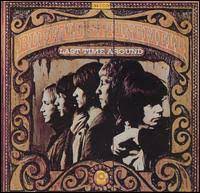
On the Way Home was written by the group's guitarist and vocalist Neil Young. The song was included on their third and final album, "Last Time Around," which was released in 1968.
"On the Way Home" is a melodic, country-tinged rock song that features Young's distinctive voice and harmonies from the rest of the band. The song's lyrics are often interpreted as a reflection on the end of a journey or relationship, and the mixed feelings of nostalgia and anticipation that can come with such a transition.
The recording features Young on lead vocals and guitar, with Richie Furay on backing vocals and rhythm guitar, Stephen Stills on backing vocals and bass guitar, and Jim Messina on lead guitar. The song's arrangement is notable for its use of acoustic and electric guitars, as well as the vocal harmonies that underpin the chorus.
"On the Way Home" was not released as a single and did not receive significant airplay, but it has since become a fan favorite and has been covered by several artists. The song is considered one of the highlights of "Last Time Around," which marked the end of Buffalo Springfield's brief but influential career.
- Drop D Tuning: No
- Capo: 2nd fret
- Rhythm: root up down up root up down up and repeat
- Picking: No
- Chords: C, F, Cmaj7, Fmaj7, Em, Dm, A#, Bbmaj7
Jump To Top
9. Rock And Roll Woman - Buffalo Springfield
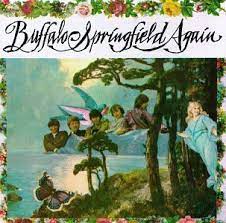
Rock and Roll Woman is a song by Buffalo Springfield, written by the group's bassist and vocalist Bruce Palmer. The song was included on their second album, "Buffalo Springfield Again," which was released in 1967.
"Rock and Roll Woman" is an up-tempo rock song with a driving beat and catchy guitar riff. The song's lyrics are often interpreted as a commentary on the changing social norms of the mid-1960s, particularly related to gender roles and sexual liberation.
The recording features Palmer on lead vocals and bass guitar, with Stephen Stills and Neil Young on guitar and Richie Furay on backing vocals. The song's arrangement is notable for its use of layered guitars and harmonies, as well as a prominent bassline that anchors the rhythm section.
"Rock and Roll Woman" was released as a single in the United States, but did not chart. However, the song has since become a classic of the rock genre and has been covered by several artists. The song's upbeat energy and catchy melody have made it a favorite of many Buffalo Springfield fans.
- Drop D Tuning: No
- Capo: No
- Rhythm: down down up down up down up and repeat
- Picking: a riff played in various places
- Chords: F, D, Am7, Dm7 (optional)
Jump To Top Famous Bands In The 60s
10. Scotch And Soda - The Kingston Trio
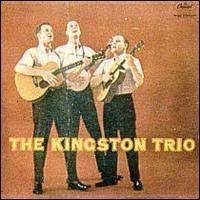
Scotch and Soda was written by Dave Guard, a founding member of The Kingston Trio. The song was first recorded by The Kingston Trio in 1958 for their self-titled debut album and became a popular track among their fans.
The song is a romantic ballad that expresses the singer's love for a woman and his desire to spend time with her over a glass of scotch and soda. The lyrics are filled with clever wordplay and metaphors, such as comparing the woman's eyes to "sunrise in the sky" and her lips to "wine in a glass."
The Kingston Trio's recording of "Scotch and Soda" features their signature three-part harmonies and acoustic instrumentation, including guitar, banjo, and bass. The song has a gentle, lulling melody that complements the romantic lyrics.
"Scotch and Soda" has since become a classic of the folk music genre and has been covered by many other artists, including The Chad Mitchell Trio, The Limeliters, and The Manhattan Transfer. The song's memorable melody, clever lyrics, and romantic sentiment continue to resonate with audiences today, making it a beloved classic in the folk music canon.
- Drop D Tuning = No
- Capo = No
- Rhythm = down down up down up down up and repeat
- Picking = Yes
- Chords = – Cmaj7, Fm, F, Ddim7, A7sus, A7, D7, Amaug5, G7, A+, C, Gm7, G, D7, Cm, Emsus, C#dim7, Ebaug5
Jump To Top
Thank you for visiting my famous bands from the 60s page and I hope you found some useful and helpful info here.
11. Three Jolly Coachmen - The Kingston Trio
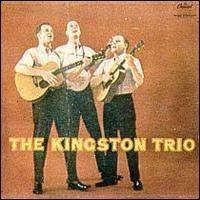
Three Jolly Coachmen is a song by The Kingston Trio, who were an American folk and pop music group that was popular in the late 1950s and early 1960s. "Three Jolly Coachmen" is one of their well-known songs, and it was included on their 1958 self-titled debut album.
The song tells the humorous story of three coachmen who race each other to win the heart of a young woman. The song's lively and catchy melody, combined with its playful lyrics, contributed to its popularity and enduring appeal among fans of folk music. The Kingston Trio played a significant role in popularizing folk music during their time and left a lasting impact on the genre.
Jump To Top Famous Bands In The 60s
12. Turn Around - The Beau Brummels
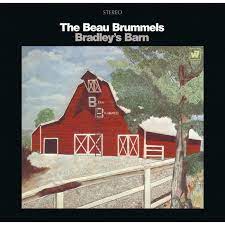
Turn Around is a significant song by The Beau Brummels, featured on their 1968 album, "Bradley's Barn." This track represented a departure from their earlier folk-rock sound, reflecting the evolving musical landscape of the late 60s.
"Turn Around" didn't chart as highly as some of their earlier hits, but it showcased the band's willingness to experiment with new styles. The song's musical style was more aligned with the psychedelic rock and country influences of the late 60s.
Over the years, "Turn Around" has taken on a unique place in The Beau Brummels' catalog, appreciated for its departure from their earlier sound and its alignment with the changing musical trends of the late 60s.
An interesting piece of trivia about the song is that it was written by Ron Elliott, one of the band's core members. "Turn Around" reflected The Beau Brummels' adaptation to the evolving music scene during a time of significant change in the industry.
Some Nashville musicians performed on this track including Jerry Reed. The Everly Brothers also covered the song in 1968.
- Drop D Tuning: Yes
- Capo: guitar tuned down 1 fret
- Rhythm: root down up root up down up and repeat
- Picking: No
- Chords: D, C, C/Cb, G
Jump To Top
13. Where Have All The Flowers Gone - The Kingston Trio
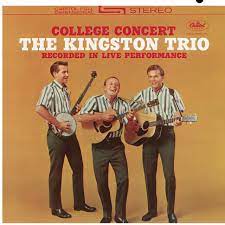
Where Have All the Flowers Gone is a song that was written by Pete Seeger in 1955. The song was popularized by The Kingston Trio, who recorded it in 1962 for their album "College Concert."
The song is a powerful anti-war anthem that uses a series of rhetorical questions to highlight the cycle of war and violence. The lyrics begin with the question "Where have all the flowers gone?" and then progress to asking "Where have all the young men gone?" and "Where have all the soldiers gone?" before finally concluding with the poignant line "When will they ever learn?"
The Kingston Trio's recording of "Where Have All the Flowers Gone" features their trademark three-part harmonies and acoustic instrumentation, including guitar, banjo, and bass. The song's simple yet powerful melody and lyrics struck a chord with audiences during a time of heightened anti-war sentiment in the United States.
"Where Have All the Flowers Gone" has since become a classic of the folk music genre and has been covered by many other artists, including Joan Baez, Marlene Dietrich, and Dolly Parton. The song's message of peace and its timeless lyrics continue to resonate with audiences today, making it a beloved classic in the folk music canon.
- Drop D Tuning = No
- Capo = 3rd fret
- Rhythm = root down up down up down up and repeat
- Picking =
- Chords = G, Em, C, D, Am
Jump To Top Famous Bands In The 60s
Thanks for stopping by my famous bands in the 60s page. I hope the info here was helpful.
If you liked this famous bands in the 60s page, you might also like ... (click images)
Popular Songs From The 60s
